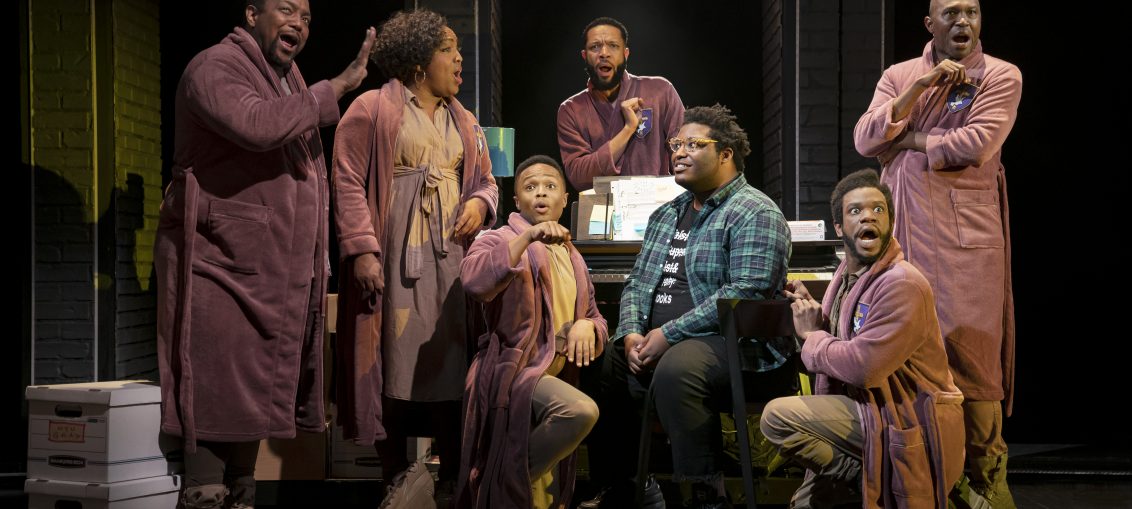
I first encountered A Strange Loop in 2015 at the Musical Theatre Factory when it was still located in a gay porn video warehouse above (the original) Drama Bookstore just around the corner of Port Authority. It was a mixed bag evening with various composers and lyricists trying out their works on performers, both eager to be heard amongst an audience of supportive peers instead of cruel critics. The song, which is the second-to-last 13 o’clock number for A Strange Loop now called “The Memory Song,” featured lyrics sung in rapid speed with mournful wailing by Larry Owens (the unconventional lead character then and now, whose voice, body and soul lend themselves so fully and appropriately it is hard to imagine anyone else in the role), “One lone black gay boy I knew who chose to turn his back on the Loooord!” They composition–a blend of gospel and indie pop rock–was equally catchy and soulful, memorable and painful. I will never forget that moment. I spoke to the composer and lyricist afterwards with tears in my eyes. Who was this person who could write something so powerful, so genuinely and astonishingly unique? The answer was Michael R. Jackson: a sweet, shy, intelligent and bespeckled queer black boy with a stocky build who graduated from NYU Tisch School of the Arts with a BFA and MFA in playwrighting and musical theatre writing.
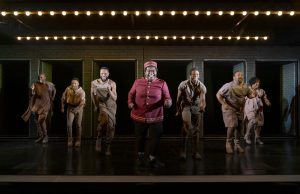
The song was from his semi-autobiographical musical about a boy much like himself: a black, queer musical theatre writer named Usher who is writing about a black, queer musical theatre writer and is stuck in a “strange loop” (a reference to the phenomenon cognitive scientist Douglas Hofstadter coined where “…by moving upwards or downwards through levels of some hierarchical system we unexpectedly find ourselves right back where we started”). It is also the title of the last track on female alt-rock dynamo Liz Phair’s seminal album Exile in Guyville. At the time I was focused mostly on producing and touring theatre and had a show going to Broadway that year, as well as a workshop for a Broadway-bound hopeful musical-in-development. I knew most of the major players in the business–commercial mostly–but I could not figure out where a genius like this could thrive and be nurtured to get to the mainstream level he merited. The work was too much of this or that to fit in the climate of the theatre market in 2015. It made sense that the one to first take a (smart) chance on the work and others like it was the original Artistic Director and Founder of MTF–Shakina Nayfack–a transwoman and force of nature for positive, revolutionary change and awareness in the theatre community who particularly supported underrepresented voices of POC and LGBTQIA artists.
Of course, now it’s 2019 and things have changed dramatically–for better and worse–which makes theatre the some of the richest grounds for radical ideas and impactful storytelling. It is not that Michael R. Jackson and A Strange Loop weren’t ready years ago; it’s that the industry, audiences and everyone else finally caught up. Fortunately, artistic incubators like Page 73 Productions and Playwrights Horizons recognized the diamond in the rough to nurture a true genius enough to bring such a remarkable piece of musical theatre from a singular voice to the stage in a fully realized vision.
New, original queer musical theatre has had an interesting journey in the 21st Century on Broadway (and Off). A brief overview: Taboo opened in 2003 as a London transfer and didn’t stick, perhaps it was too soon for Leigh Bowery, Boy George their merry misfits to parade down the Great White Way; Bare: A Pop Opera followed the themes of coming out in a Catholic school setting Off-Broadway in 2004 but also failed to take hold (even in its updated reincarnations); Pricilla: Queen of the Desert arrived on Broadway in 2011 but struggled to keep filling the seats even with Bette Midler as producer on the marquee and advertisements. Of course, there have been many others but in 2013, Kinky Boots was the first new Broadway musical with LGBTQIA themes to really break into the mainstream with continued success on Broadway, nationwide and internationally. It also introduced a much larger audience to the magnificent Billy Porter, for whom the role of Lola was a major breakout, as no doubt the role of Usher will be for Larry Owens. Now Porter is a star of stage and screen and an outspoken activist who is both seen and heard loudly. But the character of Lola is sexually ambiguous or at the very least, the show is rather PG and sexless in general, rendering it safer for the family of four from the Midwest who may be familiar with drag queens from RuPaul’s Drag Race, but might be less likely to want to confront queerness in all of its glory as well as its darkness and struggles head-on. That’s where Hedwig came in.
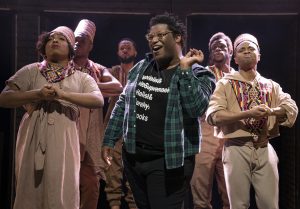
Hedwig and the Angry Inch enjoyed profound and possibly unexpected success on Broadway in 2014, sixteen years after its Off-Broadway debut and thirteen years after the film version. Hedwig is not a wholesome, family show by any means. It has a raw, aggressive and in-your-face punk rock sound and aesthetic that can verge on vulgarity as much as it celebrates truth and a personal journey. Hedwig on Broadway kicked open the door to the mainstream audiences for radical queer theatre today helped contribute to other landmark achievements such as the actress, singer and drag queen Peppermint becoming the first the first transwoman to originate a principal role on Broadway in Head Over Heels. Sadly, the jukebox musical comedy didn’t have the staying power as its predecessors such as Kinky Boots. No one can ever predict exactly how and why some shows work and some don’t, but there are two factors that are major contributors: it has to be the right time and place in the zeitgeist, and the show has to be really good.
To that, there have been several game-changers that redefined musical theatre and its audiences in the 21st century. This may seem obvious but take the case of the Hamilton phenomenon–it came just at the right time, a little ahead of the curve but not too much, and it was/is a truly excellent work of theatre. On top of it all, both Hedwig and Hamilton are authentic, as are their creators, neither of whom backed down in their visions, however odd and extreme. The same can be said of the brilliant breakout opus from Michael R. Jackson and his team: collaborator and music arranger Adam Wiggins; the masterful, savvy direction of Stephen Brackett and clever, creative choreography of Raja Feather Kelly that really drove the story; the lead, pseudo-doppelgängerr to the creator, Larry Owens, and the six “Thoughts” (L Morgan Lee, James Jackson Jr., John-Michael Lyles, John Andrew Morrison, Jason Veasey and Antwayn Hopper–all of whom are black and queer–a prerequisite) who perform many roles in the labyrinthine mind of Usher in A Strange Loop. If comparing A Strange Loop to Hamilton feels a stretch, consider this–the hope and sincere belief that truly great art, even in the form of musicals, can transform people and be both relatable and educational at the same time. Good art is either relatable or teaches you something you didn’t know before; great art does both. But Hedwig and Hamilton are performative, sexy, robust and extroverted. Usher from A Strange Loop is an introvert exposed to a harsh, glaring and unflattering spotlight, dissecting every flaw. Because of that, it is even more authentic and unapologetic than most of its musical theatre predecessors which in turn makes the show equal parts audacious, radical and alternatively hilarious and heartbreaking often all at once.
A Strange Loop deals with themes such as: identity; family drama; a sense of belonging (or not); suffering through a menial job that stalls your life’s purpose and stunts talents; disappointment and loss; looming loans; pressure from all sides; aspirations; poor sexual choices; and religion. Sure, the protagonist may only be fully relatable on all terms with a select few, but his struggles can be sincerely felt by many because Usher’s foibles are the essence of the human experience–flawed, painful and something we are all trying to figure out as we go along, though we may be too prideful to admit it. Jackson exposes these demons in the form of Usher’s “Thoughts” who act like a Greek chorus by sometimes building him up but mostly tearing him apart with criticism, occasionally dangling fanciful fruit that he may be worthy of love, attention and appreciation only to snatch those fleeting moments away with a sneer. They may be represented by six bodies onstage but they are legion and embody memories, fantasies, nightmares, insecurities and dreams. The “Thoughts” are also cast in the role of black folks (Harriet Tubman, Zora Hurston Neale and even Whitney Houston) he feels he has let down, especially his own family, who haunt him with their lack of understanding and an almost cult-like devotion to religion–a harsh blow delivered with the velvet glove of genuine love and affection misconstrued by ignorance and delusion. And while some of the more extreme aspects of the show may feel foreign to many attendees (the loveless, violent and racist sex scene is agonizing, but hints at elements of the #MeToo movement that some of us may be less aware of)–who among us can claim that they have not felt misunderstood, unfairly judged and ready to buckle under the myriad pressures inflicted upon them by society?
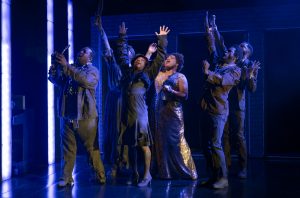
There has been corporatization of queer culture, particularly surrounding the 50th anniversary of the Stonewall riots that can range from being inclusive and positive to absurd and even offensive. Queer culture may have become more mainstream thanks to the likes of RuPaul’s Drag Race (now a national pastime) and shows such as GLEE, Pose and American Horror Story created by Ryan Murphy. But there is something truly unique about A Strange Loop because it doesn’t pander to any of the mainstream queer norms or ideals. Rather, it examines and explores the patterns created by Hofstadter’s “strange loop” theory through the lens of W.E.B. Du Bois’ apt and poignant observation of a “double consciousness, this sense of always looking at oneself through the eyes of others,” that has been inescapably thrust upon black folks in America and could be considered a triple or quadruple consciousness in the case of Usher who also doesn’t fit into the ideals of society at large physically or sexually.
What’s in a name? For Usher and Michael R. Jackson–a lot. The character’s name denotes his position at The Lion King musical (one of the few long-running shows in Broadway at the time of A Strange Loop’s conception to feature a majority of black bodies on stage), where he works in a perpetual purgatory chiming the five-minute call bell to signify intermission is ending. But unlike his monotonous job, there is no intermission for Owens, who almost never leaves the harsh, relentless glare of the spotlight for 140 minutes as he uncovers vulnerabilities, moments of weakness and fears in an unforgettable way that “goes there” unblinkingly time and again. Usher is also a reference to the name of a famous singer, as is Michael Jackson, giving both a sense of anonymity and living in the shadows of icons whose status is light years out of reach. Art imitates life and the lines are blurred as the “Thoughts” who represent his family are named for The Lion King figures, adding more layers of symbolism.
Perhaps the most pervasive ghost of a famous person–who is never portrayed directly but looms over the production nonetheless–is none other than Tyler Perry. He is celebrated by the family but haunts Usher, and his influence and ubiquitousness threaten to squash the unique voice of a struggling talent. The most outrageous moments in A Strange Loop revolve around Usher resisting then relenting to create a Perry-style gospel stage play chock-full of black cultural stereotypes that ends with saving the so-called sinners. While Perry has adamantly defended his work–which he prefers to be referred to as “urban theatre circuit”–many critics felt his and other “Chitlin’ Circuit” plays had set the black race back centuries. But while Tyler Perry, Michael Jackson, even fellow Playwrights Horizons alumni playwright-director Robert O’Hara (who Jackson has been repeatedly mistaken for) are all successful black men in their own right–by virtue of being black, queer, dealing with frameworks of theatre or even bearing the same name doesn’t make Michael R. Jackson comparable to any of them. With this breakout hit, Jackson has shattered any box he may have been previously shoved into and has carved out a special spot all his own.
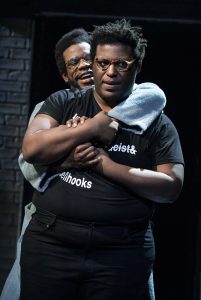
His musical styles (aided by Adam Wiggins and Charlie Rosen) are richly varied, catchy yet complex and contain elements of alternative and indie rock with nods to traditional musical theatre style, gospel, Hitchcockian foreboding, and rock/rap opera not like Hamilton but more akin to Rent and Kendrick Lamar’s magnificently theatrical album To Pimp A Butterfly. While Jackson’s muses such as Tori Amos and especially Liz Phair (whose music he originally wanted to use for A Strange Loop) and his “Inner White Girl” might be more comfortable at Lilith Fair than Off-Broadway (though Amos penned The Light Princess in London), he has taken inspiration from a variety of unconventional sources to develop a distinctive voice sonically and especially in his storytelling.
The evening I saw A Strange Loop was a balmy summer Sunday in the midst of WorldPride Month. It was a week before NYC Pride weekend with the parade, Pride Island performances at Pier 97 and other festivities. Black and queer stage and screen royalty were in attendance, including Broadway powerhouse Rebecca Naomi Jones, who is currently in the Tony-winning progressive re-envisionment of Oklahoma!, and Mj Rodriguez who plays the leading role of Blanca Evangelista on the FX show Pose, a TV drama that boasts the largest cast of transgender actors starring as regulars in a scripted series. There was laughter and tears during the show and following it in the lobby where Jackson and the cast posed for pictures, signed autographs, conversed and emphatically embraced the enthusiastic attendees (VIP and otherwise). There is something utterly glorious about being a witness to black and queer expressions of unabashed joy and triumph. For people who have historically (and presently) suffered so much, there is a heightened sense of exuberance, emotion, warmth and rapture that radiates infectiously. The jubilation is almost an act of defiance and rebellion in spite of double consciousness and oppressive forces. The same could be said of the feeling that lingers long after that last syllable is punctuated and the curtain closes on A Strange Loop, a show that defies genres or stereotypes but kicks the door open for “all those black gay boys I knew who chose to turn their backs on the Lord.”
A Strange Loop is currently running at Playwrights Horizons and has been extended through July 28, 2019, due to popular demand. For tickets and more information: https://www.playwrightshorizons.org/shows/plays/strange-loop/
 Sunday, January 4, 2026
Sunday, January 4, 2026
One thought on “A STRANGE LOOP Raises the Bar for Queer Black Representation and Sets a New Standard for Musicals Today”